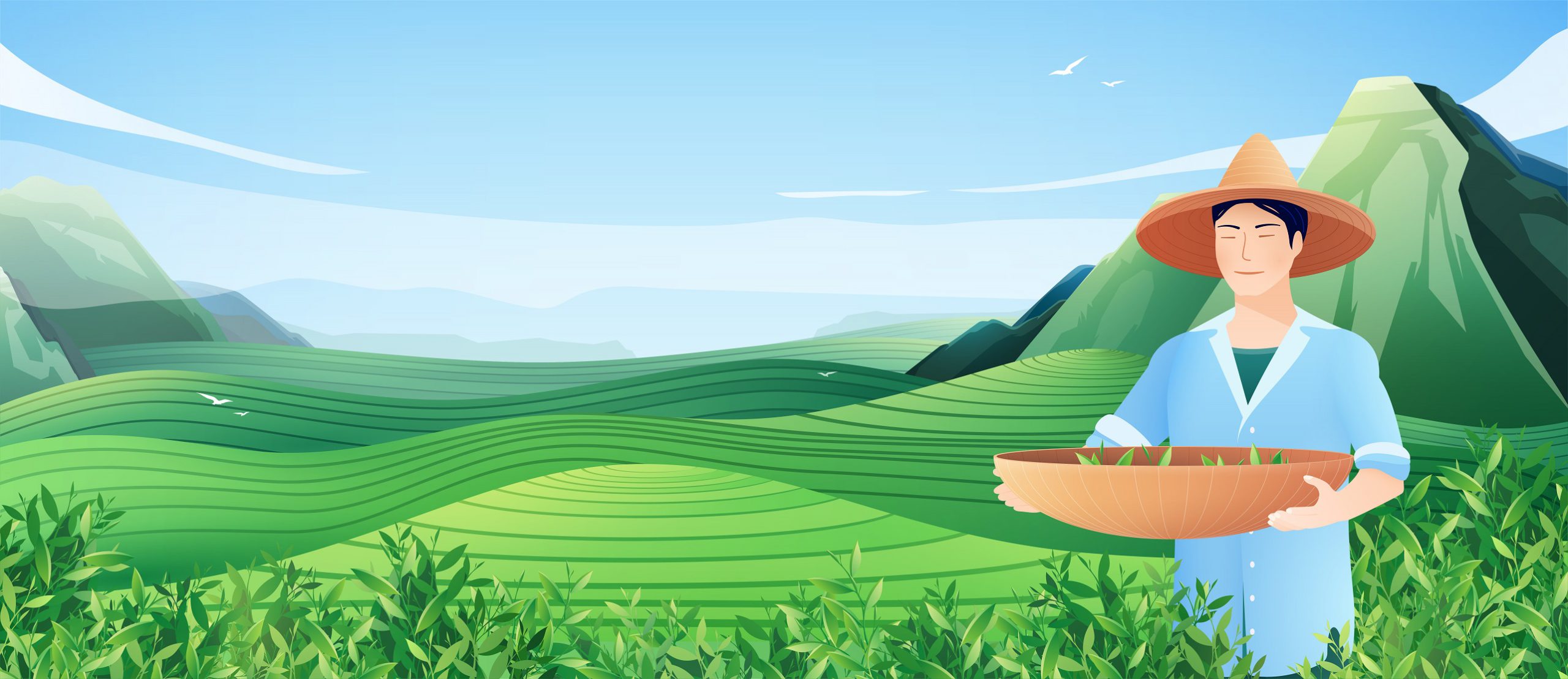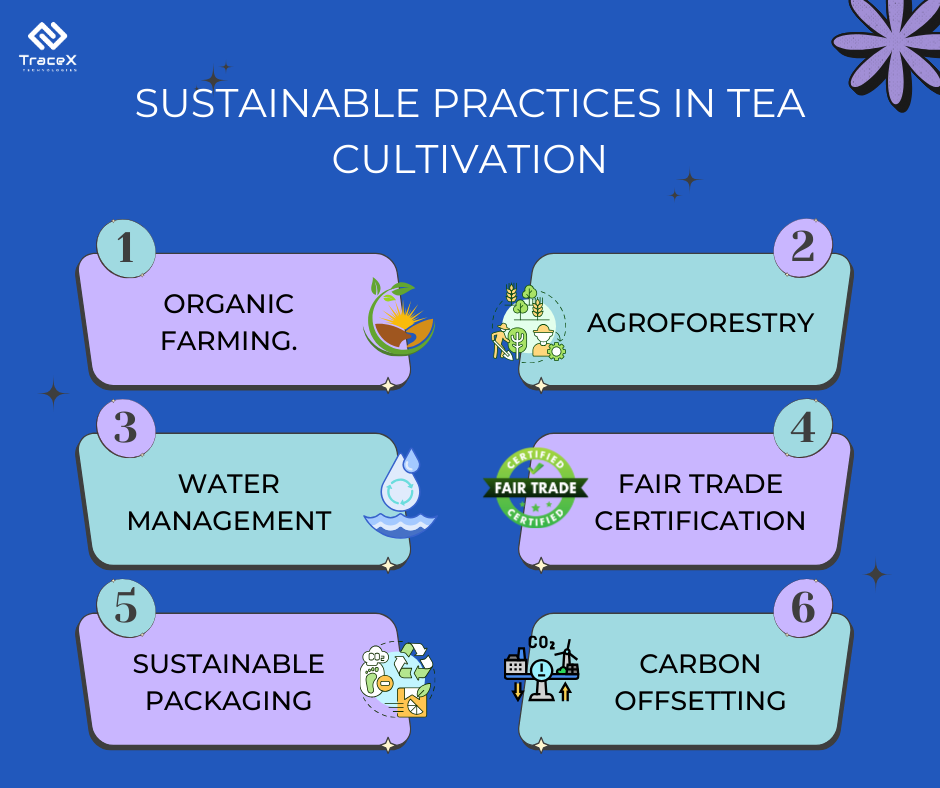Contact: +91 99725 24322 |
Menu
Menu
Quick summary: Explore the journey of sustainability in the tea value chain and discover how technology solutions are revolutionizing practices from plantation to cup. Delve into the complexities of ethical sourcing, fair trade, and environmental stewardship in this insightful exploration of the tea industry's green evolution.

The worldwide tea industry is a major actor in the global economy, worth billions of dollars annually. It covers the cultivation, processing, packaging, and distribution of numerous types of tea, with major producers including China, India, Kenya, and Sri Lanka. Embark on a journey through the intricate web of the tea value chain, where sustainability takes centre stage in shaping the industry’s present and future.
Tea is the third most consumed beverage on Earth, following only water and coffee.
From the lush plantations where tea leaves are meticulously harvested to the bustling auction houses and retail shelves where they find their way into our cups, every step holds potential for positive environmental and social impact.
The tea value chain encompasses all stages involved in producing tea, from cultivation to consumption.
Cultivation: Tea cultivation begins with planting and nurturing tea bushes in suitable climates and soil conditions. This stage involves various agricultural practices to ensure optimal growth and yield.
Harvesting: Once the tea bushes reach maturity, skilled workers hand-pluck the tender leaves and buds, often in multiple rounds throughout the year. The timing and method of harvesting can significantly impact the flavour and quality of the tea.
Processing: The harvested tea leaves undergo processing, which typically involves withering, rolling, oxidation (fermentation), drying, and sorting. Each tea type (e.g., green, black, oolong) requires specific processing techniques to achieve its desired flavour profile.
Packaging: After processing, the tea is packaged into various forms, including loose-leaf tea, tea bags, or ready-to-drink formats. Packaging also involves labelling and branding to communicate product information and attract consumers.
Distribution: Tea products are then distributed to wholesalers, retailers, or directly to consumers through various channels, such as supermarkets, specialty tea shops, online platforms, or tea rooms.
Consumption: Finally, consumers purchase and enjoy tea either at home, in cafes and restaurants, or on the go. The tea-drinking experience encompasses brewing, serving, and savouring the diverse Flavors and aromas of different teas.
Sustainability is critical in the tea value chain for environmental reasons, social responsibility, and economic viability. Throughout the value chain, sustainability practices, including eco-friendly cultivation methods, fair labour practices, and ethical sourcing, play an increasingly vital role in meeting consumer demand for responsibly produced tea.
Many individuals possess limited knowledge about the tea-making process. While one would expect tea production to adhere to sustainable and fair-trade practices, this isn’t always the reality. It’s crucial to recognize that not all tea companies prioritize sustainability or organic practices. In some tea estates, pesticides are indiscriminately sprayed over crops, and workers may not receive fair wages or ethical treatment.
In the context of tea farming, sustainability refers to the ability to produce tea in a way that meets current demands while preserving future generations’ ability to satisfy their own needs.
Environmental stewardship entails implementing techniques that reduce environmental effect, such as water conservation, soil conservation, and biodiversity preservation. This includes decreasing the use of agrochemicals, implementing organic farming practices, and preserving natural habitats.
Social responsibility is providing fair treatment and improved livelihoods for tea workers and local communities. This involves paying equitable salaries, ensuring access to healthcare and education, and encouraging gender equality and cultural diversity.
Economic viability entails ensuring profitability and resilience for tea growers through effective resource management, diversification of income streams, and fair-trading practices.

Sustainable farming practices provide eco-friendly options. Organic farming does not use synthetic chemicals, instead depending on natural methods like composting, crop rotation, and biological pest management. Agroforestry combines trees into tea plantations to provide shade, boost biodiversity, and improve soil health. Water conservation measures, such as drip irrigation and rainwater collection, reduce water consumption and environmental impact.
These sustainable approaches not only reduce the environmental impact of tea cultivation, but also improve biodiversity conservation, soil health, and climatic resilience. Adopting such approaches can result in more ecologically friendly and socially responsible tea producing systems.
Sustainable processing technologies in the tea business seek to reduce energy usage and waste throughout the manufacturing process. This includes implementing energy-efficient techniques such as solar drying for tea leaves, biomass boilers for heating, and optimising machinery to reduce electricity consumption. To reduce the environmental impact, waste reduction options include recycling and composting tea processing bi-products such as tea dust and stems.
Furthermore, eco-friendly packaging choices, such as biodegradable or compostable materials, recyclable packaging, and the use of minimum packaging, contribute to lessen tea products’ environmental imprint. Initiatives to reduce packaging waste include promoting reusable containers, providing bulk purchase choices, and encouraging consumers to prioritise products with sustainable packaging when making purchasing decisions.
Unlock the key to eco-friendly, innovative packaging practices for green supply chains
Discover the Future of Sustainable Packaging
Tea workers suffer a number of social and economic issues, including low pay, terrible working conditions, and limited access to basic amenities. Fair labour standards, including as fair salaries, safe working conditions, and access to healthcare and education, are critical for enhancing the lives of tea workers. Fair trade certifications ensure that tea growers follow these guidelines, assuring customers that their purchases support ethical operations.
Poverty, a lack of infrastructure, and social injustice are among major difficulties that tea workers face. Community development activities are critical in tackling them. These efforts aim to improve access to healthcare, education, clean water, and housing for tea-producing areas. By supporting fair labour practices and community development programmes, customers may contribute to developing a more equitable and sustainable tea business.
Certification agencies such as the Rainforest Alliance, Fair Trade, and UTZ play an important role in validating and promoting tea sector sustainability standards. These organisations establish strict criteria for environmental stewardship, social responsibility, and economic viability. Adherence to these principles guarantees that tea growers follow ethical and sustainable methods such as fair worker treatment, biodiversity conservation, and responsible resource management.
Certifications assure buyers that the tea they buy was produced in a socially and environmentally responsible manner. They also encourage manufacturers to adopt sustainable practices by providing access to premium markets and boosting customer confidence. Overall, compliance with sustainability standards and certifications benefits both growers and consumers by promoting a more sustainable and equitable tea business.
Technology solutions empower stakeholders across the tea value chain to overcome challenges, drive efficiency, and promote sustainability and ethical practices. Traceability solutions offer a comprehensive suite of tools to address the challenges of the tea value chain, driving transparency, sustainability, and market access for tea producers.
TraceX traceability solutions revolutionize the tea value chain:
TraceX’s blockchain-powered traceability platform enables tea producers to create immutable records of their tea’s journey, from cultivation to consumption. This transparency assures consumers of the tea’s origins, cultivation methods, and processing techniques, fostering trust and loyalty.
Through TraceX’s data analytics capabilities, tea growers gain valuable insights into their cultivation practices. By analyzing data on weather conditions, soil health, and crop performance, growers can optimize their processes to enhance yield, quality, and sustainability.
TraceX facilitates the monitoring of sustainable practices within the tea value chain. By digitally tracking environmental parameters, water usage, and pesticide application, tea producers can ensure compliance with sustainability standards and minimize their environmental footprint.
TraceX’s digital platform provides tea producers with direct access to global markets and trading opportunities. By showcasing their products’ traceability and sustainability credentials, producers can attract premium buyers and secure fair prices for their tea.
TraceX empowers tea producers to engage with consumers through transparent and informative communication. By sharing real-time data on tea production and sustainability initiatives, producers can educate consumers and build brand loyalty.
Elevate your tea value chain with TraceX today!
Regenerative agriculture approaches, which focus on repairing ecosystems and improving soil health, are emerging as new trends in sustainable tea production and consumption. Furthermore, there is a growing interest in carbon-neutral tea manufacturing methods and novel technologies for reducing water consumption and waste.
Future problems for the tea business include dealing with the effects of climate change on tea planting, guaranteeing fair salaries and working conditions for workers, and satisfying rising consumer demand for transparency and ethical sourcing. However, these problems provide potential for innovation, such as investing in climate-resilient tea varietals, applying blockchain technology to improve supply chain transparency, and forming partnerships to promote social and environmental sustainability. Overall, adopting sustainability will be critical to the tea industry’s long-term viability and prosperity.
In conclusion, embracing sustainability in the tea value chain isn’t just a choice; it’s a responsibility. By adopting technology solutions like TraceX, tea companies can revolutionize their practices, ensuring transparency, ethical sourcing, and environmental stewardship every step of the way. These solutions not only enhance brand reputation and consumer trust but also pave the way for a brighter, more sustainable future for the entire tea industry. Now is the time for tea companies to seize the opportunity and lead the charge towards a greener, more equitable tea value chain.
